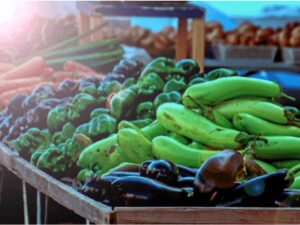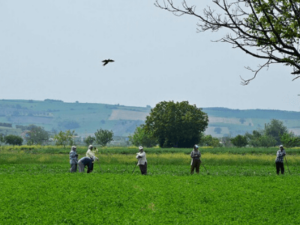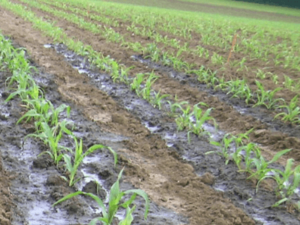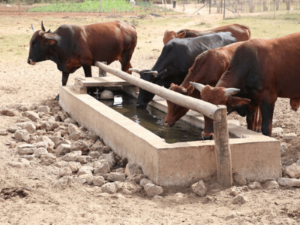
The shutdown of coronavirus would have a detrimental effect on the Indian agriculture market. The national freeze has enraptured the economy. The sector is facing a great deal of trouble with laborers and product transportation. While agricultural products are exempted from lockdown directives as an important commodity, police are causing a lot of problems for the industry.
Double Impact After Lockdown
The Indian agriculture sector that recently suffered from erratic monsoon will face another hit due to coronavirus disruptions. With the approaching Rabi harvest season, farmers are worried about their standing crops. Farmers growing wheat, mustard, and pulses have already complained about crop damage due to recent premature and heavy rainfall. This led farmers to patch their crops, but most of the laborers available fled to their homes amid the Coronavirus lockdown.
Workers Fleeing to Home
While the restriction on the movement of commodities persists in the middle of the lockout, it is likely that farmers will feel the pinch in their profits. The government has also issued evidence of lying potatoes harvested on fields due to labor shortages. Pradip Kumar Majumdar, Chief Agricultural Marketing Advisor at West Bengal CM, said most of the workers from Bihar and Jharkhand had returned to their hometown because of the fear of coronavirus.
Farmers also fear the seeding of summer season crop as none of the shops that sell seeds, fertilizers, and other essential inputs. In addition, many farm machines such as combine and harvesters are lying stranded on highways as there is no one to run them.
 Lockdown hampers Consumer Movement
Lockdown hampers Consumer Movement
Coronavirus lockout has affected the agricultural crop supply chain. By tolling on loading and unloading agricultural products. The shutdown has also impeded the movement of lorries carrying critical commodities. Several owners of cold storage and warehouse protested about the dearth of the staff. Most laborers remain home or leave for their homes, unable to work fearing police beating.
Impacts of COVID-19 on Farming
The novel coronavirus (COVID-19) is now considered a pandemic by the World Health Organization. The rapidly changing situation poses concerns all over the U.S. In recent weeks, the stock market has taken on a hit generating wild uncertainty and there are increasing worries about the virus and our reaction to it causing a major decline in the general economy.
But what about Farming? Below are six specific issues producers, farming households, ag employers and ag employees need to be informed of and prepare for.
1. Markets and farm markets. As we see rising rates of concern, “social distancing” guidelines, reduced travel, avoiding crowds, closures, and other preventive practices to slow COVID-19 spread, customers can make difficult choices about food, eating away from home, and overall expenditure. Dairy is prominently featured in out-of-home dining and foodservice sales may experience some disturbances. That is likely to impact markets and prices. Across other countries, there have also been bottlenecks at ports as ships are waiting to be packed with U.S. dairy and other farm products. Until further notice, the Chicago Mercantile Exchange has shut down trade in all goods

2. Slowdowns and shortfalls in the supply chains. As logistics is disrupted and attempts are continuing to slow the spread of the virus, several sectors of the linked industry are already affected. The “panic buying” creates additional concern with certain goods. The American Veterinary Medical Association (AVMA) is suggesting, as an example of supply chain interruptions on farms, the potential for animal pharmaceutical products to be in short supply for at least some of the larger drug producers. If the virus were to spread more widely in an agricultural state such as Wisconsin, we might see problems with the distribution of farm products and pick-up as workers-such as drivers of milk trucks– Stay home because of sickness or because they care for family members or children of school age. This will impact processors with the same concerns. Slowdowns may also affect the flow and availability of fertilizers, fuel, and other inputs as we head into spring. In an extreme case, we may have concerns with utilities-electricity, natural gas, propane-based on availability of inputs or shortages of labor. Utility firms, however, typically do effective contingency planning work that helps mitigate the effects of unexpected events.
3. Farmers’ health. Farmers in the Midwest, as contrasted with the general worker population, are a relatively older group. The 2017 ag census shows the average age of farm operators in most other industries is nearly 58 – at least a full ten years older than the workers. And, unlike other farmworkers in the sector, 26 percent are 65 years of age and above. A full 11.7 percent of our key farm operators are 75 years of age and older. Data from other countries that have carried out more rigorous studies show that COVID-19 has a much higher severity level for those in their 60s and older, suggesting that CDC and state health experts ‘preventive and protective guidelines are important for our farming population.
4. Agricultural workers. Even if the risk of infection in the general population remains fairly small, we’re likely to see some workers who end up sick. But, even more significantly, even though the risk of infection remains small (single digits), it is highly likely that employees may need to be out of work especially with school holidays and/or staff who need to stay home to care for sick or elderly members of the family. Fear of this occurrence and lack of knowledge may also contribute to increased absenteeism.

6. Additional Disruptions. Sparse populations and less frequent travel can provide rural communities with a natural social distance but rural residents can face challenges. Most meeting areas are being closed and ordered to suspend daily activities and events, such as schools and churches. As a substitute, online classes and services are taught in some areas, and for high school and college students. This could be challenging for some rural residents as there is no high-speed internet service available in some areas of the state including some of our large agricultural-based communities.
Things that impact on Agriculture due to corona lockdown
1. Availability of fertilizers and seeds in the market during the lockdown
To ensure that farmers do not face problems with the harvesting of rabbit crops in the coming days, the Center exempted from the lockdown rules on Friday mandates, procurement agencies, farm activities, agricultural machinery hiring centers and intra- and inter-state movement of farm equipment.
The government has also exempted farm employees, as well as manufacturing and packaging units of fertilizers, pesticides, and seeds from the lockdown order, according to the Ministry of Home Affairs ‘latest directive.
Fertilizer shops and custom farm machinery hire centers were also permitted to operate during the lockdown time, it said.
“Agencies engaged in the procurement of agricultural products have been exempted, including minimum support price (MSP) operations, mandis run by APMC or as notified by the State Government,” the statement added.
The directive comes in the wake of farmers facing problems harvesting their rabi crops and getting them to the mandis following a nationwide lockdown to prevent coronavirus spread.
In some areas, harvesting of rabi (winter) crops such as wheat, mustard, corn, and pulses have started and will pick up in the coming months.

Agriculture Minister Narendra Singh Tomar said on Saturday that farming operations and related activities were exempted from the lockdown rules for smooth harvesting of rabi crops and ensuring the country’s food security.
“At this crucial time, exemptions were provided for activities related to agriculture to ensure adequate food supply to the people after the lockdown. It is also done to ensure that ordinary citizens and farmers are not faced with problems,” Tomar said in a statement
To ensure farmers do not face harvesting problems, the Center has instructed the ministries and state governments concerned to strictly obey the exemptions, he added.
Tomar said exemptions were given for farm activities after he discussed farmers ‘and farm organization issues with the Home Ministry.
On March 27, the government exempted from the lockdown rules farm activities, farm employees, custom hiring centers of farm harvesters and implements, as well as mandis and procurement agencies.
The government has allowed fertilizer shops to work, and during the lockdown time, even the manufacturing and packaging of fertilizers, pesticides, and seeds were allowed.
Inter and Intra movement of sowing and harvesting-related farm machinery is also excluded from the lockdown laws.
3. Transport restrictions during nationwide lockdown have affected the logistics operations resulting in the production of agricultural products to enter the market and the public
With a population of 1.3 billion remaining indoors to combat the COVID-19 virus, India finds it hard to get a move on and questions are being raised on what the 21-day lockdown will do for the country’s critical logistics sector.
A major economic impact of the novel virus is the resulting inefficiencies across the already overburdened logistics landscape in the country, which, according to India Brand Equity Foundation (IBEF), employs over 40 million people and contributes $200 billion-plus to the economy. The vast segment, considered the country’s lifeline, is of vital importance because it links different markets, suppliers, and customers across the world.
It was determined, in the midst of the growing crisis, that this vital sector should be allowed to operate, especially when carrying essential commodities. Yet the wheels are coming off on the sixth day of the lockout.
The country’s largest eCommerce marketplaces Flipkart and Amazon have discontinued their logistics services to sellers on their sites, citing operational constraints. According to the Indian Retailers Association (RAI), the supply chain of about 25,000-30,000 supermarkets has been affected so far due to the reported lockdown.
According to Pranshu Kacholia, VP Company, ClickPost, data from 10 to 20 March shows that, compared with last month’s average, the outbreak and subsequent lockdown across states resulted in a 9 percent rise in stock shipments, a 21 percent increase in order delays and a strong 9 percent decrease in delivery rate. What is interesting is that this data applies to the time prior to the start of the nationwide lockout on March 25, which means the figures will be even worse.
According to the logistics platform representative, there are 31 pin codes in Pune which most logistics companies have blocked. “We are witnessing a percentage of fulfillment in Kerala and Maharashtra to be reduced by about 5-10 percent,” Kacholia points out, adding with lots of rumors that either the ground staff is no longer involved or the customers themselves do not welcome shipments, they might be contaminated.
4. Farm employees, agricultural firms excluded from lockout
Fresh guidelines have been issued by the Union home ministry exempting additional categories relating to agricultural operations. “Regarding the 21-day lockout, they were excluded under the Disaster Management Act,” an order said.
The second addendum released on Friday by home secretary Ajay Bhalla exempted farmworkers in the fields and farming operations from farmers, agricultural product procurement agencies including MSPs, mandis approved by state governments, inter and intra-state movement of harvesting and seeding related machinery and manufacturing, fertilizer packaging units, pesticides, and plants.
Public transport movement was limited during the 21-day shutdown while markets, schools, and other institutions were closed down. During the time of lockdown, only critical services and goods are allowed.
On Thursday, the home ministry established standard operating procedures (SOPs) to deliver critical services through e-commerce and requested States and Union Territories to notify shop-specific steps, including food, grocery, fruit, vegetables, milk items, among others, to ensure supplies.
5. Coronavirus outbreak: Govt grants relaxation lockdowns for agriculture, livestock sectors
Saturday’s government granted exemptions and relaxation to agriculture and related industries in the midst of the continuing coronavirus lockdown. Agricultural machinery shops, their spare parts, and their supply chain, and maintenance and truck repair shops on highways, preferably at fuel pumps, should remain open to promote the transport of farm produce. The tea industry can also operate with up to 50 percent of the workers, including plantations.
However, it is hoped that the heads of organizations will ensure that adequate hygiene steps are taken and that social distancing norms are put into effect. Home Ministry has advised the district authorities to ensure that the orders are strictly enforced.
A report by KPMG India said that if COVID-19 spreads further, India’s GDP growth rate could be lower than expected in FY21. India’s growth may fall below 3 percent if the virus continues to spread in India and, according to the study, lockdown sees an extension.
India, meanwhile, is currently under a 21-day lockdown to tackle the spread of coronavirus pandemics. More than 2,000 people have so far been infected by the rapidly spreading coronavirus outbreak. PM Modi on Thursday asked chief ministers to devise a phased strategy, according to a government statement, as part of its preparations to exit the lockdown. PM Modi urged the country’s people earlier today to keep their spirits up despite the lockdown due to COVID-19. He also asked the people on Sunday to light candles at their doorsteps to spread light in those dark times.
 Advisory for farmers
Advisory for farmers
Crops harvesting & threshing
The rabi crops are approaching maturity amid the danger of COVID-19 spreading. The harvesting and handling of the crop, including its transportation to the market, is unavoidable as it is time-bound for the agricultural operations. Famers must, therefore, take care and protective measures to prevent the spread of the disease. Simple steps include social distance, personal hygiene by washing hands with soap, wearing a face mask, protective clothing, and cleaning of tools and machines. Workers are expected to obey safety measures and social distancing at any stage of the entire field operations cycle.
- In many northern states, wheat harvesting is approaching by combining harvesters and their movement within and between states is permitted. Precautions and health measures shall be maintained for workers engaged in repair, maintenance, and harvest operations.
- Mustard is the second important rabi crop, manual harvesting is ongoing and threshing is needed wherever it has already been harvested
- Lentil, maize and chili harvesting is underway and gram is fast approaching.
- The cultivation of sugar cane is at its peak and is also time for manual seeding in the north
- Personal hygiene and social distance steps to be taken by those involved in the harvesting of all field crops, fruits, vegetables, eggs, and fish before, during, and after the field operation.
- In case of harvesting/picking manual field operations, conduct the operation in 4-5 foot spaced strips assigning one stripe to one person. It will allow a fair balance between the work undertaken.
- All working persons will use masks at regular intervals and ensure hand washing for the store.
- Maintain a reasonable distance of 3-4 feet during rest, meal taking, product transfer at the collection stage, load / unload.
- Stagger the field operations whenever possible to stop recruiting more staff on the same day.
- Engage only familiar persons to the extent possible and to prevent the entry of any suspect or probable carrier during field operations, after fair inquiry.
- Wherever possible, choose mechanized processes to manual. The system should be authorized only to accompany the necessary numbers of persons.
- All machines should be sanitized at regular intervals and at the entry stage. It is also necessary to sanitize all transport vehicles, gunny bags or other packaging material
- Feed collection should be performed in small heaps spaced at 3-4 feet and field level processing will be distributed to 1-2 people/heap in order to prevent crowding.
- Proper sanitation and threshers’ cleanliness for harvested maize and groundnut should be maintained particularly when machines are shared and used by groups of farmers. Copious cleaning of regularly handled areas of the system with soap is recommended.
Also, see Could Coronavirus be Transmitted Through Fresh Vegetables and Fruits?
Govt Measures are taken to reduce the lockdown effect on farming
- Relaxation of transport movements supplying agriculture goods
2. Business as usual in agriculture markets ensuring prompt procurement of farm produces maintaining the social distance
3. Arranging sufficient farming resources & cattle foods or diaries and other animal foods
4. Direct purchase from farmers and designated govt purchase centers reachable to farmers
5. Special squads on studying the food shortage and manage the farm produce to meet the crisis demand.
Final Thoughts
However, the Govt of India is coming ours with a lot of measures to prevent food shortage during the coronalockdown and encouraging farmers to continue their farming assuring stable agriculture markets and logistics. Let’s hope this lockdown will not affect food security in the country.
Also, see Impact and Advantages of Latest Agriculture Technologies in India

 Lockdown hampers Consumer Movement
Lockdown hampers Consumer Movement Advisory for farmers
Advisory for farmers




